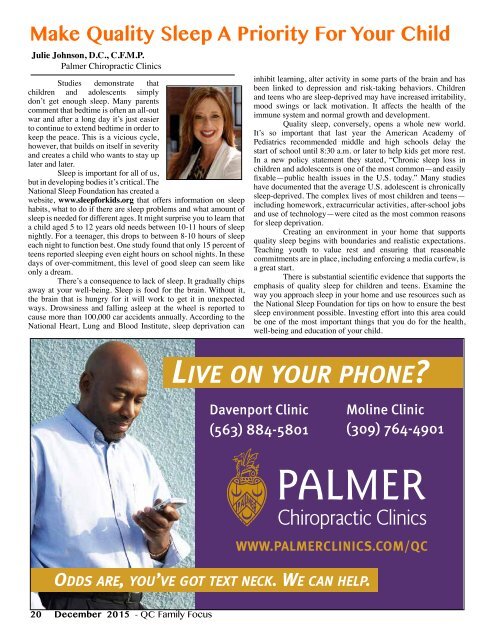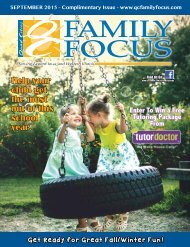QC Family Focus: December 2015
In this issue: Selecting safe holiday toys for your young child, Apps to get you in the holiday spirit, Happy holidays with teenagers at home, Traditional nutrition, Toys games and the eyes, Robotics and STEM, The three Ws of philanthropy, Oral hygiene
In this issue: Selecting safe holiday toys for your young child, Apps to get you in the holiday spirit, Happy holidays with teenagers at home, Traditional nutrition, Toys games and the eyes, Robotics and STEM, The three Ws of philanthropy, Oral hygiene
You also want an ePaper? Increase the reach of your titles
YUMPU automatically turns print PDFs into web optimized ePapers that Google loves.
Make Quality Sleep A Priority For Your Child<br />
Julie Johnson, D.C., C.F.M.P.<br />
Palmer Chiropractic Clinics<br />
Studies demonstrate that<br />
children and adolescents simply<br />
don’t get enough sleep. Many parents<br />
comment that bedtime is often an all-out<br />
war and after a long day it’s just easier<br />
to continue to extend bedtime in order to<br />
keep the peace. This is a vicious cycle,<br />
however, that builds on itself in severity<br />
and creates a child who wants to stay up<br />
later and later.<br />
Sleep is important for all of us,<br />
but in developing bodies it’s critical. The<br />
National Sleep Foundation has created a<br />
website, www.sleepforkids.org that offers information on sleep<br />
habits, what to do if there are sleep problems and what amount of<br />
sleep is needed for different ages. It might surprise you to learn that<br />
a child aged 5 to 12 years old needs between 10-11 hours of sleep<br />
nightly. For a teenager, this drops to between 8-10 hours of sleep<br />
each night to function best. One study found that only 15 percent of<br />
teens reported sleeping even eight hours on school nights. In these<br />
days of over-commitment, this level of good sleep can seem like<br />
only a dream.<br />
There’s a consequence to lack of sleep. It gradually chips<br />
away at your well-being. Sleep is food for the brain. Without it,<br />
the brain that is hungry for it will work to get it in unexpected<br />
ways. Drowsiness and falling asleep at the wheel is reported to<br />
cause more than 100,000 car accidents annually. According to the<br />
National Heart, Lung and Blood Institute, sleep deprivation can<br />
inhibit learning, alter activity in some parts of the brain and has<br />
been linked to depression and risk-taking behaviors. Children<br />
and teens who are sleep-deprived may have increased irritability,<br />
mood swings or lack motivation. It affects the health of the<br />
immune system and normal growth and development.<br />
Quality sleep, conversely, opens a whole new world.<br />
It’s so important that last year the American Academy of<br />
Pediatrics recommended middle and high schools delay the<br />
start of school until 8:30 a.m. or later to help kids get more rest.<br />
In a new policy statement they stated, “Chronic sleep loss in<br />
children and adolescents is one of the most common—and easily<br />
fixable—public health issues in the U.S. today.” Many studies<br />
have documented that the average U.S. adolescent is chronically<br />
sleep-deprived. The complex lives of most children and teens—<br />
including homework, extracurricular activities, after-school jobs<br />
and use of technology—were cited as the most common reasons<br />
for sleep deprivation.<br />
Creating an environment in your home that supports<br />
quality sleep begins with boundaries and realistic expectations.<br />
Teaching youth to value rest and ensuring that reasonable<br />
commitments are in place, including enforcing a media curfew, is<br />
a great start.<br />
There is substantial scientific evidence that supports the<br />
emphasis of quality sleep for children and teens. Examine the<br />
way you approach sleep in your home and use resources such as<br />
the National Sleep Foundation for tips on how to ensure the best<br />
sleep environment possible. Investing effort into this area could<br />
be one of the most important things that you do for the health,<br />
well-being and education of your child.<br />
LIVE ON YOUR PHONE?<br />
Davenport Clinic<br />
(563) 884-5801<br />
Moline Clinic<br />
(309) 764-4901<br />
WWW.PALMERCLINICS.COM/<strong>QC</strong><br />
ODDS ARE, YOU’VE GOT TEXT NECK. WE CAN HELP.<br />
20 <strong>December</strong> <strong>2015</strong> - <strong>QC</strong> <strong>Family</strong> <strong>Focus</strong>
















